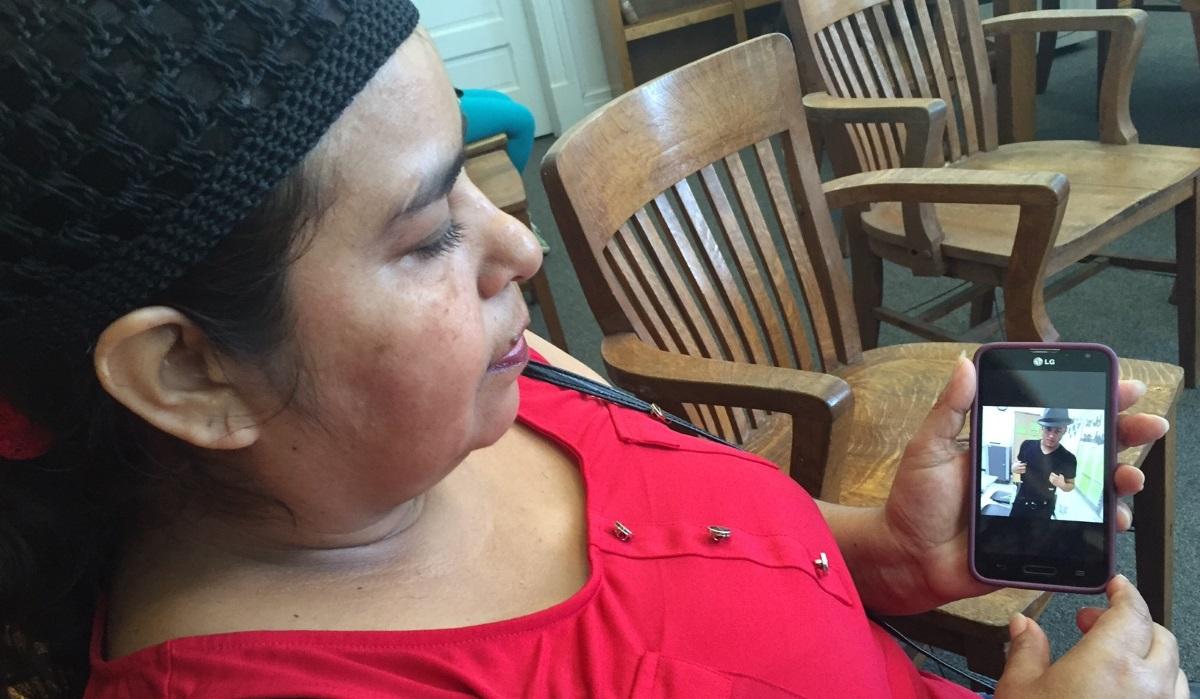8 Months In Immigration Detention: A DeKalb Teen’s Story

Dora Hernandez looks at a picture of her son, Jaime Arceno Hernandez, who’s currently a detainee at Irwin County Detention Center.
Elly Yu / WABE
In December, Dora Hernandez was waiting for her son to come home, having prepared him food – eggs and refried beans.
Her son, Jaime Arceno Hernandez, had gone to the immigration court office in Atlanta that morning, like he had done several times since he crossed the border illegally two years ago when he was 16, she said. He, like many unaccompanied minors who were stopped at the border, were given court hearings to try to contest deportation.
As it got later in the day, she kept texting him about why he hadn’t come back yet. Jaime didn’t respond.
“I became sad because I knew he wasn’t going to come back,” she said in Spanish.
Jaime was detained that day and later sent to the Irwin County Detention Center, about three hours south of Atlanta. According to a spokesperson for Immigration and Customs Enforcement, he was detained because he had turned 18 and already had a final deportation order.
Jaime was one of thousands of unaccompanied minors who crossed the U.S.-Mexico border during the surge in 2014. According to the U.S. government, more than 60,000 unaccompanied minors came to the U.S. in fiscal year 2014. Most of them were from Central America. The reasons they came to the U.S. vary, but advocates say many of the youths were trying to escape gang violence and poverty.
Because they were under 18, unaccompanied minors like Jaime weren’t immediately sent back, but they fought deportation in immigration court seeking asylum or another legal option.
“I fled because of the violence and also received multiple death threats,” Jaime said in Spanish over the phone at the detention center.
He said gangs had threatened to kill him, and he also wanted to be with his mom, who he’d been separated from for more than a decade.
When he arrived in Georgia after being processed through the federal government, he lived with his mom and went to school in DeKalb County. Last spring, a federal immigration judge issued him a final deportation order, when he was still 17.
He turned 18 a few months later, but he said he didn’t expect to be detained when he went to immigration court in December.
“When they told me I was going to stay there, I got very sad and then started crying because I realized I wasn’t going to see my mom again,” he said.
In the past year, the Department of Homeland Security under the Obama administration has been focusing on people who came to the U.S. as unaccompanied minors since 2014 and have now turned 18. If they have a final deportation order, they are considered “priorities for removal,” under the agency’s current policies.
In January, federal immigration officials in an operation picked up 121 people, mostly from Georgia, Texas and North Carolina. Then, in March, the agency said it arrested 336 people, many of whom had entered the country as children. According to ICE, the majority of them were also from Georgia and the Carolinas.
“As I have said repeatedly, our borders are not open to illegal migration,” said DHS Secretary Jeh Johnson in a statement in March. “If someone was apprehended at the border, has been ordered removed by an immigration court, has no pending appeal, and does not qualify for asylum or other relief from removal under our laws, he or she must be sent home. We must and we will enforce the law in accordance with our enforcement priorities.”
Greg Wickersham, Jaime’s former teacher at the DeKalb County International Student Center, wrote a letter in support of Jaime. He said he doesn’t understand how students like Jaime fit within the government’s priorities, which also include those who’ve committed felonies.
“A student, a kid who’s a teenager and is doing what is right, is still in school, applying themselves and studying and working to attain a better life and are escaping violence or lack of opportunity there — to me that doesn’t sound like a priority if someone’s not a danger,” Wickersham said.
Despite the final removal order, Jaime’s lawyer said he has several additional applications pending for him to stay in the country, including one for asylum.





